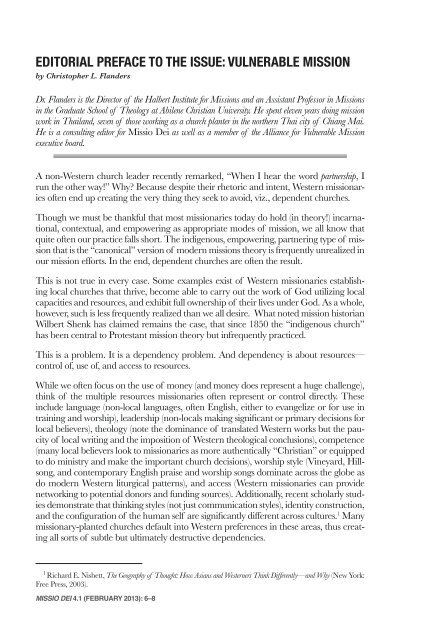VULNERABLE MISSION
VULNERABLE MISSION
VULNERABLE MISSION
Create successful ePaper yourself
Turn your PDF publications into a flip-book with our unique Google optimized e-Paper software.
EDITORIAL PREFACE TO THE ISSUE: <strong>VULNERABLE</strong> <strong>MISSION</strong><br />
by Christopher L. Flanders<br />
Dr. Flanders is the Director of the Halbert Institute for Missions and an Assistant Professor in Missions<br />
in the Graduate School of Theology at Abilene Christian University. He spent eleven years doing mission<br />
work in Thailand, seven of those working as a church planter in the northern Thai city of Chiang Mai.<br />
He is a consulting editor for Missio Dei as well as a member of the Alliance for Vulnerable Mission<br />
executive board.<br />
A non-Western church leader recently remarked, “When I hear the word partnership, I<br />
run the other way!” Why? Because despite their rhetoric and intent, Western missionaries<br />
often end up creating the very thing they seek to avoid, viz., dependent churches.<br />
Though we must be thankful that most missionaries today do hold (in theory!) incarnational,<br />
contextual, and empowering as appropriate modes of mission, we all know that<br />
quite often our practice falls short. The indigenous, empowering, partnering type of mission<br />
that is the “canonical” version of modern missions theory is frequently unrealized in<br />
our mission efforts. In the end, dependent churches are often the result.<br />
This is not true in every case. Some examples exist of Western missionaries establishing<br />
local churches that thrive, become able to carry out the work of God utilizing local<br />
capacities and resources, and exhibit full ownership of their lives under God. As a whole,<br />
however, such is less frequently realized than we all desire. What noted mission historian<br />
Wilbert Shenk has claimed remains the case, that since 1850 the “indigenous church”<br />
has been central to Protestant mission theory but infrequently practiced.<br />
This is a problem. It is a dependency problem. And dependency is about resources—<br />
control of, use of, and access to resources.<br />
While we often focus on the use of money (and money does represent a huge challenge),<br />
think of the multiple resources missionaries often represent or control directly. These<br />
include language (non-local languages, often English, either to evangelize or for use in<br />
training and worship), leadership (non-locals making significant or primary decisions for<br />
local believers), theology (note the dominance of translated Western works but the paucity<br />
of local writing and the imposition of Western theological conclusions), competence<br />
(many local believers look to missionaries as more authentically “Christian” or equipped<br />
to do ministry and make the important church decisions), worship style (Vineyard, Hillsong,<br />
and contemporary English praise and worship songs dominate across the globe as<br />
do modern Western liturgical patterns), and access (Western missionaries can provide<br />
networking to potential donors and funding sources). Additionally, recent scholarly studies<br />
demonstrate that thinking styles (not just communication styles), identity construction,<br />
and the configuration of the human self are significantly different across cultures. 1 Many<br />
missionary-planted churches default into Western preferences in these areas, thus creating<br />
all sorts of subtle but ultimately destructive dependencies.<br />
1 Richard E. Nisbett, The Geography of Thought: How Asians and Westerners Think Differently—and Why (New York:<br />
Free Press, 2003).<br />
MISSIO DEI 4.1 (FEBRUARY 2013): 6–8


